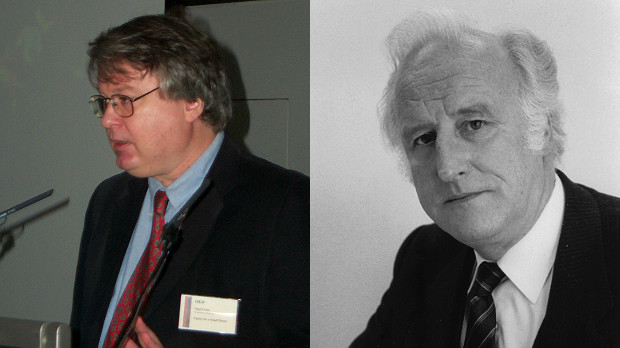Remembering Nigel Cross and Brian Walker, leading lights of IIED
Camilla Toulmin reflects on the life of former IIED director Nigel Cross, and the institute also pays tribute to a past president.


Nigel Cross (left) and Brian Walker were both influential in the development of IIED (Images: IIED)
When Nigel Cross joined IIED in 1999 as its executive director, he brought a special approach and set of skills. He had been a social historian and journalist, he’d taught at the Open University and in 1983 he had successfully set up and then run a small NGO focused on the African drylands, SOS-Sahel International UK.
He had asked for the start of his role at IIED to be shifted from June to the end of the summer so he could think and prepare himself for the challenge of moving into the institute’s offices in Endsleigh Street.
He made good use of his summer, and then set about creating a more structured organisation with systems to ensure different voices from across the institute could be heard.
Nigel put in place an international board of trustees, able to contribute critical reflections to shape IIED’s work. He held a series of regional strategy dialogues from Bangkok to Accra, Lima to Nairobi, so that the institute could listen to personalities and partners in different parts of the world and discuss with them in depth their perceptions and problems.
And he initiated a set of international fellowships to recognise pathbreaking work by IIED’s partners, and offer time and space to develop their ideas. When I took over the running of IIED, in 2003, I benefited greatly from Nigel’s organisational spadework.
From an academic family, Nigel studied English at Sussex University before going on to do a PhD in social history at University College London. He was keen on listening and actively seeking out the views of people pushed to one side, traits which were put to good use when he set up SOS-Sahel.
Here, he set up a series of effective, well-grounded projects to support local land management and community development in Sudan, Ethiopia, Niger and Mali. He also led an innovative oral history project that interviewed 500 elderly people in the Sahel to get their views on how things had changed over their lifetime. This was published as ‘At the Desert’s Edge’.
Trust local people
Building further on this work when he joined Panos in 1995, Nigel commissioned Hugo Slim to lead an oral history project called ‘Listening for a change’. He recognised clearly that too many development experts seem to know what the solutions are to any given problem, before listening to the people concerned. Individual testimonies provide a valuable counterpoint to easy generalisations and unveil a more complex and nuanced warp and weft of social relations and attitudes.
Nigel was kind, smart and thoughtful, and had a quiet authority. He listened and considered before deciding what to do. He gave creative and energetic people the responsibility and support to take on big challenges. He had an originality of mind and an intuitive feel for people, creating an apparently relaxed setting that was able to deliver a demanding programme of work and collaboration.
In 2001, he identified climate change as a critical issue and encouraged climate change expert Saleemul Huq to join IIED, an inspired move that has reshaped IIED’s portfolio of work over the last two decades.
After the rather idiosyncratic style of IIED’s former director Richard Sandbrook, the institute’s business and relations with funders were now on a level and predictable path. Nigel had an ability to coax money from a wide range of funders, crafting meticulously composed letters and proposals to hook their support.
When Nigel left IIED, he took up a professorial fellowship at the School of Oriental and African Studies, which allowed him more time to write. He also became principal consultant for the International Development Limited group and contributed to the boards of several international NGOs.
From 2008 to 2011, Nigel had the challenging task of establishing the South Sudan offices of Dutch development group SNV. This involved long stints in Juba, where he met his second wife Josephine Namusisi. His latter years were spent at her home in Uganda, with occasional stretches of time among his books in Salisbury. He leaves two daughters, Harriet and Madeleine from his first marriage, and grandson Reuben.
Remembering Brian Walker
Also highly significant in the development of IIED was Brian Walker, the institute’s president during a vital period in the 1980s, who has died aged 88.
Under his leadership, IIED made major contributions to the hugely significant Brundtland Commission report ‘Our Common Future’ and developed world class research programmes on human settlements, energy, forestry and environmental economics.

A former director general of Oxfam, Brian was instrumental in establishing the first global seed bank for food crops and for acting to break the political and humanitarian isolation of Cambodia after the fall of Pol Pot.
Also the founder director of Earthwatch Europe, he is survived by his children Peter, Clare, Dorcas, Gráinne, Siobhan and Sarah.
IIED director Andrew Norton said: “We are still building on the legacy of Brian, Nigel and others and this has given IIED the firm foundation that it relies on today.”